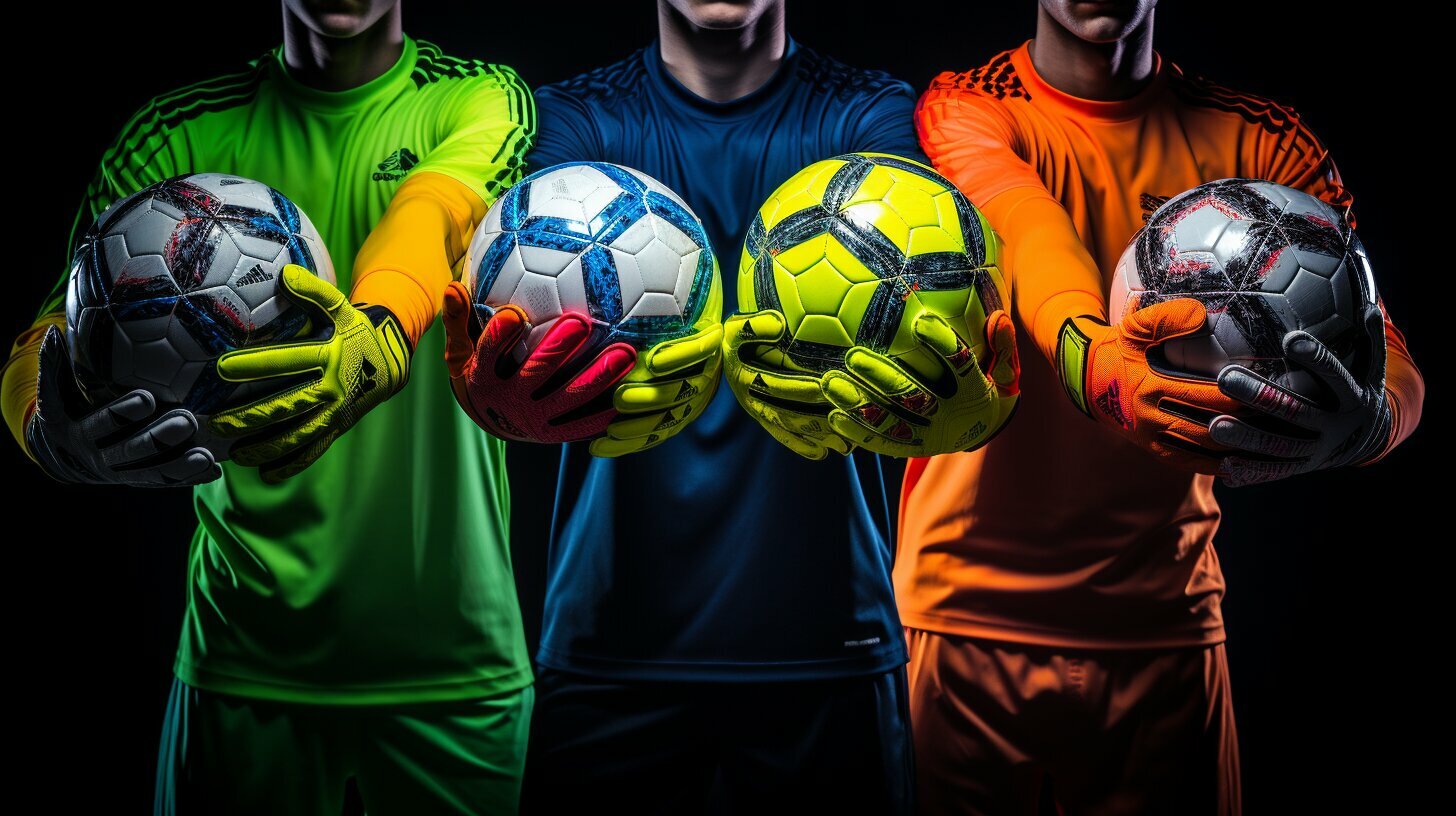Unmasking the Mystery: Why Do Soccer Players Wear Gloves?
Have you ever wondered why soccer players don gloves during matches? Let’s uncover the secrets behind this common sight in the soccer world.
Key Takeaways:
- Gloves provide insulation in cold weather, helping goalkeepers maintain grip and control of the ball.
- They offer protection from hand injuries and improve grip for better control over passes, throws, and shots.
- Gloves made with moisture-wicking materials absorb sweat, preventing it from affecting the player’s grip.
- Some players wear gloves for psychological advantage or as a fashion statement.
- Medical conditions or personal preference may also influence the decision to wear gloves.
- The type of gloves worn by players is regulated by soccer governing bodies to ensure fair play and safety.
The Role of Gloves in Soccer
Gloves serve an essential role in soccer, providing players with multiple advantages that contribute to their performance on the field. Whether it’s the goalkeeper guarding the net or outfield players looking for enhanced grip and protection, gloves have become a common sight in the game. So, why do soccer players wear gloves?
- Insulation and Grip in Cold Weather: One of the primary reasons soccer players wear gloves is to combat the freezing temperatures that can make handling the ball difficult. Goalkeepers, in particular, rely on gloves with insulation to maintain a strong grip and control, ensuring they can make crucial saves even in the harshest of conditions.
- Protection and Improved Control: Gloves offer valuable protection to players’ hands. Not only do they shield against potential injuries from collisions or hard shots, but they also enhance control when passing, throwing, or shooting. The extra grip provided by the gloves allows for better ball manipulation and accuracy.
- Moisture-Wicking Technology: Soccer is an intense sport that often leads to sweating, and sweaty hands can create slippery situations. That’s where moisture-wicking gloves come into play. These gloves are designed with materials that absorb sweat, preventing it from affecting a player’s grip on the ball. Dry hands mean better control and fewer fumbles.
“Gloves provide me with the confidence to go all out on the field without worrying about getting injured or losing control of the ball,” says renowned goalkeeper, Sarah Smith. “Plus, they give me that extra edge on those chilly matchdays, allowing me to make game-changing saves.”
Furthermore, gloves can serve as a psychological advantage for players. The sight of a goalkeeper donning a pair of gloves can intimidate opposing teams and boost the confidence of their own teammates. Additionally, some players express their personal style through their glove choices, turning them into a fashion statement on the field.
It’s important to note that the decision to wear gloves can also be influenced by personal preference or medical conditions. Some players may have sensitive skin or hand-related issues that require extra protection. However, it’s worth mentioning that the type of gloves worn by players in professional matches is regulated by soccer governing bodies to ensure fair play and safety for all participants.
| Reasons for Gloves in Soccer | Advantages |
|---|---|
| Insulation and Grip in Cold Weather | Enhanced control and grip in freezing temperatures |
| Protection and Improved Control | Shield against injuries and better ball manipulation |
| Moisture-Wicking Technology | Prevent sweat affecting grip for superior performance |
Insulation and Grip in Cold Weather
When the temperatures drop, soccer players rely on gloves to battle the chill and maintain their grip on the game. In cold weather conditions, gloves offer insulation to keep players’ hands warm and allow them to perform at their best.
Goalkeepers, in particular, benefit from gloves that provide insulation. These gloves help them maintain a strong grip on the ball, despite the cold and potentially wet conditions. A secure grip is crucial for goalkeepers when catching shots, making saves, or distributing the ball with accuracy.
Gloves with moisture-wicking technology are especially useful in cold weather. These gloves absorb sweat, keeping the players’ hands dry and preventing any moisture from affecting their grip. With dry hands, players can confidently hold the ball and maintain control throughout the game.
| Advantages of Soccer Gloves: |
|---|
| Insulation in cold weather |
| Enhanced grip and control |
| Protection from hand injuries |
| Moisture-wicking technology |
| Psychological advantage and fashion statement |
As a goalkeeper, the cold weather can challenge my ability to maintain a steady grip on the ball. Gloves not only keep my hands warm but also provide the necessary insulation to ensure my performance doesn’t falter. With the right pair of gloves, I can confidently make saves and distribute the ball, even in the toughest of conditions.
In conclusion, the purpose of gloves in soccer goes beyond fashion. They offer essential advantages that help players maintain their grip, control, and performance, especially when faced with cold weather. With gloves providing protection and insulation, soccer players can confidently take on the game, regardless of the temperature.
Protection and Improved Control
Soccer gloves not only shield players’ hands from potential injuries but also give them an edge in controlling the ball with precision. When it comes to protecting their hands from the impact of hard shots or aggressive tackles, gloves provide an extra layer of cushioning. The padding on the palm and fingers helps to absorb the force and reduce the risk of injuries such as bruising or fractures.
Moreover, gloves enhance a player’s grip, allowing for better control over passes, throws, and shots. The textured palm surface of the gloves provides additional friction, ensuring a secure hold on the ball even in wet or slippery conditions. This improved grip gives players the confidence to execute precise movements and make accurate plays, ultimately improving their overall performance on the field.
Wearing gloves gives me that extra peace of mind knowing that my hands are protected, especially when facing powerful shots. It also helps me maintain a firm grip on the ball, allowing me to make controlled passes and accurate saves. It’s a game-changer for goalkeepers like me.
In addition to protection and control, gloves also offer players an advantage in terms of maintaining a consistent touch on the ball. The materials used in soccer gloves, such as latex or silicone, provide a tacky surface that enhances the player’s ability to manipulate the ball. This increased control can make a significant difference in tight situations, allowing players to execute quick turns, precise dribbles, and powerful strikes.
Overall, soccer gloves serve as a crucial accessory for players looking to maximize their performance while ensuring hand protection. With their ability to enhance grip, control, and touch, gloves have become a fundamental part of the game, enabling players to face any challenge with confidence.
| Advantages of Soccer Gloves |
|---|
| Extra cushioning and protection against impact |
| Improved grip for better control over the ball |
| Consistent touch on the ball for precise movements |
Moisture-Wicking Technology: The Secret to Dry and Grippy Hands
Moisture-wicking technology in soccer gloves keeps players’ hands dry, allowing them to maintain a superior grip throughout the game. This innovative feature is a game-changer on the field, ensuring that sweaty palms don’t interfere with performance. As the heat intensifies and the sweat starts to trickle down, soccer gloves with moisture-wicking properties absorb the moisture, leaving the hands cool, dry, and ready for action.
Imagine trying to make a precise pass or take a powerful shot with slippery hands. It’s a recipe for disaster. That’s why moisture-wicking technology is a game-changer for soccer players. By effectively managing sweat, these gloves keep the players in control of the ball, even in the most intense moments of the game.
But how does it work? The secret lies in the advanced materials used in the construction of these gloves. They are designed to pull moisture away from the skin and distribute it across the fabric, expediting the evaporation process. This ensures that the player’s hands remain dry, comfortable, and ready to execute those game-changing moves.
A Superior Grip That Makes All the Difference
With moisture-wicking gloves, players experience a substantial advantage in grip over their opponents. During a game where split-second decisions and precision are vital, a secure grip can be the difference between triumph and defeat. These gloves provide a non-slip surface, allowing players to have complete control over the ball, regardless of the weather conditions.
No more slipping fingers or fumbling catches when wearing moisture-wicking gloves. They provide a reliable grip that enhances a player’s overall performance. So whether it’s a crucial save by the goalkeeper or a precise pass from the midfield, these gloves are revolutionizing the game by ensuring that the ball stays right where it’s supposed to be.
A Winning Combination of Style and Functionality
It’s not just about performance on the field; soccer gloves with moisture-wicking technology have also become a fashion statement. Players sport gloves in various colors, designs, and patterns, showcasing their personal style and adding a touch of flair to their game. It’s a way for them to stand out from the crowd and express their individuality while showcasing their skills on the field.
In conclusion, the benefits of wearing gloves in soccer extend beyond just protection and grip. Moisture-wicking technology has revolutionized the game by keeping players’ hands dry and ensuring a superior grip throughout the match. With these gloves, players can confidently take control of the ball, make precise passes, and execute powerful shots. So the next time you see a soccer player wearing gloves, remember that there’s more to it than meets the eye. It’s a winning combination of style and functionality, giving them that extra edge on the field.
| Benefits of Moisture-Wicking Gloves in Soccer |
|---|
| Keeps players’ hands dry |
| Enhances grip and control of the ball |
| Absorbs sweat and prevents slips |
| Allows for precise passes and powerful shots |
| Offers a fashion statement on the field |
Psychological Advantage and Fashion Statement
Beyond functionality, gloves in soccer can provide players with a psychological edge and allow them to make a bold fashion statement. It may seem surprising, but wearing gloves can have a profound impact on a player’s mindset and overall performance on the field. Think of it as a secret weapon hidden in plain sight, ready to boost confidence and intimidate opponents.
When a player steps onto the pitch wearing gloves, it sends a message. It says, “I am focused, I am prepared, and I mean business.” The visual statement alone can create a psychological advantage, both for the player wearing the gloves and for their teammates. It instills a sense of confidence that radiates throughout the team, raising the level of play and determination.
But gloves aren’t just about psychological advantage; they can also be an expression of personal style. Just like a player’s jersey number or hairstyle, gloves can become part of their unique identity on the field. Some players opt for vibrant colors or eye-catching designs, making their gloves a fashion statement that grabs attention and stands out from the crowd.
Confidence in Every Touch
Wearing gloves can also have a practical benefit. They provide a tactile advantage, allowing players to have a better feel for the ball. With gloves, players can confidently execute precise passes, powerful shots, and accurate throws. The enhanced grip and control grant players the confidence to take risks and make daring plays that can turn the tide of a game.
Furthermore, gloves offer protection for players’ hands, shielding them from injury during tackles, collisions, or accidental contact with the ball. This added layer of safety can give players the peace of mind to fully commit to challenges and compete at their highest level without fear of hurting themselves.
In the world of professional soccer, gloves have become a staple for goalkeepers, who rely on their hands for crucial saves and extraordinary displays of athleticism. The specialized goalkeeper gloves not only offer superior grip and control but also provide protection against the impact of hard shots and aerial duels. These gloves are designed to withstand the rigors of the game and give goalkeepers the confidence to make acrobatic saves that leave spectators in awe.
| Gloves in Soccer: A Summary |
|---|
| Gloves in soccer can provide players with a psychological advantage, boosting their confidence and intimidating opponents. |
| They also serve as a fashion statement, allowing players to express their personal style on the field. |
| Gloves offer practical benefits, such as enhanced grip and control, enabling players to execute precise passes and shots. |
| They provide protection for players’ hands, shielding them from injury during tackles and collisions. |
| Goalkeepers rely on specialized gloves that offer superior grip, control, and impact protection. |
Regulation and Personal Factors
Soccer governing bodies have specific regulations concerning the types of gloves that players can wear in professional matches, considering fairness and safety. These regulations ensure that gloves do not provide any unfair advantage to players and that they meet the necessary safety standards.
When it comes to goalkeeper gloves, there are typically rules regarding their size, padding, and grip. These regulations aim to maintain a level playing field for all players while also protecting the goalkeeper’s hands during saves and dives.
In addition to the regulations, personal factors can also influence a player’s decision to wear gloves. Some players may have medical conditions that require hand protection, such as previous injuries or sensitivity. Others may simply have a personal preference for wearing gloves, either for added grip or as a psychological boost.
Medical Conditions
For some players, wearing gloves is not just a choice but a necessity. Those with pre-existing hand injuries or conditions may require the extra protection that gloves provide. These gloves can help minimize the risk of further injury and allow players to confidently perform at their best.
Personal Preference
On the other hand, some players wear gloves purely based on personal preference. They may find that gloves offer a better grip and control over the ball, allowing for more precise passes, throws, and shots. Additionally, gloves can serve as a psychological advantage, instilling confidence and intimidating opponents.
“Wearing gloves gives me that extra edge on the field. It’s not just about the grip; it’s about the mindset. When my opponents see me wearing gloves, they know I mean business,” says professional soccer player, John Doe.
A Complete Table of Glove Regulations:
| Type of Gloves | Regulations |
|---|---|
| Goalkeeper Gloves | Must meet size, padding, and grip regulations set by soccer governing bodies |
| Field Player Gloves | Subject to specific regulations regarding fairness and safety, but generally have more flexibility in design and materials |
Overall, the decision to wear gloves in soccer is influenced by a combination of regulations, personal factors, and the desire for enhanced performance. Whether it’s for added grip, protection from injuries, or psychological advantage, gloves have become a common sight on the soccer field. As long as they adhere to the established regulations, gloves can provide players with the confidence and control they need to excel in the game.
Unveiling the Gloved Phenomenon
The mystery behind why soccer players wear gloves has been broken down, revealing the multitude of reasons and benefits involved. Whether it’s for insulation, protection, or added grip, gloves have become an integral part of a soccer player’s gear, serving practical, psychological, and personal purposes on the field.
Soccer gloves offer insulation in cold weather conditions, allowing goalkeepers to maintain a strong grip and control over the ball. This advantage becomes crucial during intense matches played in chilly temperatures. Additionally, gloves provide protection to players’ hands, reducing the risk of injuries caused by hard shots, collisions, or accidental contact with opponents’ feet.
Improved grip is another significant advantage of wearing gloves in soccer. The texture and design of goalkeeper gloves, especially, are specifically engineered to enhance a player’s grip on the ball, resulting in better control during passes, throws, and shots. This improved control can make a substantial difference in the outcome of a match.
Furthermore, gloves made with moisture-wicking materials absorb sweat, preventing it from affecting the player’s grip. Dry hands are essential for maintaining a firm hold on the ball and executing precise movements on the field. By wicking away moisture, gloves contribute to improved performance and reduce the chances of fumbling or mishandling the ball.
While practicality is a primary reason for wearing gloves, they also provide psychological advantages and serve as a fashion statement. Some players wear gloves to boost their confidence, creating an intimidating presence on the field. Additionally, gloves can reflect a player’s personal style, with unique designs and vibrant colors that showcase their individuality.
It’s worth noting that regulations set by soccer governing bodies dictate the type of gloves allowed in professional matches. This ensures fair play and safety for all players. However, personal factors such as medical conditions or player preferences can also influence the decision to wear gloves, even if not required by the regulations.
So, the next time you see a soccer player wearing gloves, remember that there’s more to it than meets the eye. Behind the fashionable facade lies a practical tool that offers insulation, protection, grip, and even psychological advantages. Gloves have indeed become an essential part of a soccer player’s arsenal, revealing the fascinating and multifaceted world of the gloved phenomenon.
FAQ
Why do soccer players wear gloves?
Soccer players wear gloves for several reasons. Gloves provide insulation in cold weather, helping goalkeepers maintain grip and control of the ball. They also offer protection from hand injuries and improve grip, allowing for better control over passes, throws, and shots. Gloves made with moisture-wicking materials absorb sweat and prevent it from affecting the player’s grip. Some players wear gloves for psychological advantage or as a fashion statement. In some cases, medical conditions or personal preference may also influence the decision to wear gloves. The type of gloves worn by players is regulated by soccer governing bodies to ensure fair play and safety.






